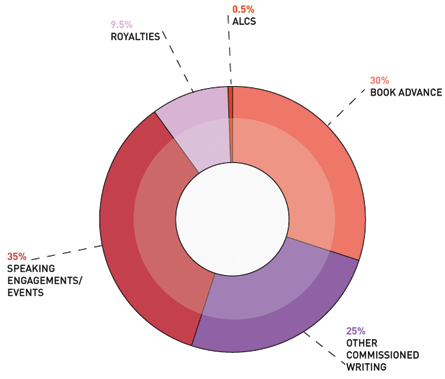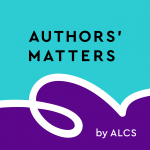My Writing Living: Priya Basil
Over 30,000 ALCS members live and write outside the UK. This month we talk to one of them: acclaimed novelist and essayist, Priya Basil. Born in London, Priya has lived in Germany since 2002.
“My life has always been this movement between different places and people, between different cultures and flavours,” Priya Basil tells me during a visit she is making to London to promote her most recent book. Entitled Be My Guest: Reflections on Food, Community and the Meaning of Generosity, it’s a short and singular autobiographical meditation about what it means to be hospitable in our world today. It moves from enticing descriptions of kadhi, a creamy curry that her mother lovingly prepares every time Basil visits, to calling for democracy to “house difference, shelter diversity and welcome novelty”.
Basil’s biography makes her eminently well placed to reflect on such matters; a woman for whom the answer to the question “where are you from?” is a complex one. Born in London in 1977 into a family with Indian Sikh roots, she grew up in Kenya in the 1970s and 80s, and for the past 17 years has lived in Germany. The author of two novels, a novella and numerous essays, her work has been nominated for the Commonwealth Writers’ Prize, the Dylan Thomas Prize, and the IMPAC Dublin Literary Award. Basil is also an activist and the co-founder of Authors for Peace, a political platform for writers and artists, which among other causes, has championed the idea of a Europe-wide public holiday to celebrate European unity.
What I didn’t anticipate was that learning another language would also give me new eyes on English, and change the way I write because I’m much more alert to words on a sentence level than I was before.
Be My Guest, which explores the meaning of hospitality both in a philosophical and a political sense, is dedicated to Berlin, the city to which Basil moved in in 2002, at the invitation of her German partner, now husband. “I knew I wanted to write but at the time I was working in an advertising agency and just wasn’t one of those amazing people who manage to write alongside a full-time job. My partner offered me the chance to come and live with him, and to write while he supported me for a year, and to see what happened. This gift of time and space brought me to Berlin where I wrote my first novel – Ishq and Mushq. It was published in a two-book deal, and so I stayed in Germany. It was a time of security and good fortune which meant that this writing life began to seem like a life that was possible. I do think though that if I had been single, it would have been much more of a struggle.”
While Basil now speaks fluent German and became a German citizen at the end of last year, she still writes in English. But it was the German translation by Beatrice Fassbender of Be My Guest that came out first, in advance of the English edition. “Prior to my new book, most of what I’ve written has been published in German translation but not in the original English. To be writing in one language but being read mainly in another gives you a very strange relationship to a language and a place,” reflects Basil. “But what I didn’t anticipate was that learning another language would also give me new eyes on English, and change the way I write because I’m much more alert to words on a sentence level than I was before.”
Priya’s average income sources

Although she took a risk in giving up a full-time job in the UK and moving to Germany to try and forge a writing career, Basil has since found her adopted homeland a very supportive environment in which to do so. “One great thing about being in Germany is that writers get paid for doing events and readings: there’s never any question about it. The fee can be between €200 and €2,000 for doing an event, depending on how established they are. And so, by doing events myself, I was able to have a steady, regular income. There’s also something called the Berlin Senate Stipendium – it’s always been there for German language writers resident in Berlin, but a few years ago they opened it to applications from those who write in other languages too, and it’s now worth €24,000. It’s a fantastic opportunity which supports eight writers each year. I received the stipendium a few years ago – back then it was €8,000, but it was still a huge boost and gave me a different kind of freedom. I also began to curate part of the programme for the Berlin International Literature Festival, and then got invited by other institutions to do similar work so that’s been another way of earning money. I feel fortunate that for the first time in ten years I have a very comfortable income again thanks to Be My Guest. But it hasn’t always been easy and it would have been much harder had I been on my own.”
I would never want to say what literature should be or what writing should be because I think the freedom to create out of whatever impulse takes one over is really vital.
Basil also feels fortunate to live and work in a country where the writing profession is held in high regard. “Tremendous respect and value is placed on the role of the writer, and there’s also a lot of state support for writing and for culture in Germany. If you look at the coalition agreement of the current government, it’s explicitly written into the culture and media section that artistic expression is the basis of democracy, and it is through culture that democracy is expressed and shaped. That freedom of expression is vital for a flourishing society; and the government is committed to making sure that culture is available for all. I don’t want to sound like a sort of poster girl for German culture because there are many things that are not ideal in Germany. But I think they really do recognise that culture is something that is essential for our well-being as a society and for our development.”
Does she think writers have a responsibility to try and make the world a better place through their work? “I would never want to say what literature should be or what writing should be because I think the freedom to create out of whatever impulse takes one over is really vital. That’s the core of what makes good art. But I personally feel a strong responsibility, partly because I feel so lucky and privileged in the way that I’ve been able to live, moving between different countries and cultures with relative ease, just because I have a British passport. So, for me, part of writing is to engage with some of the pressing issues of our time. But I also really value the option to escape all of that, and read something, or see something just because it’s beautiful, and nourishing in a different way. I think we need both of those things, and so art has to allow for the artist to work from any motivation.”
Interview by Caroline Sanderson
 You can hear the full discussion between Priya and Caroline in the next episode of Authors’ Matters by ALCS, our podcast in which we talk to writers about the way they make their living.
You can hear the full discussion between Priya and Caroline in the next episode of Authors’ Matters by ALCS, our podcast in which we talk to writers about the way they make their living.
Listen to previous episodes here and subscribe so you don’t miss the next one.
